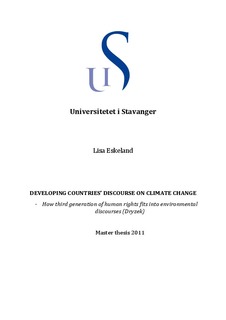Developing countries' discourse on climate change
Master thesis
Permanent lenke
http://hdl.handle.net/11250/184560Utgivelsesdato
2011Metadata
Vis full innførselSamlinger
- Studentoppgaver (SV-IMS) [1384]
Sammendrag
This thesis looks at how the Group of Seventy-Seven and China frame the concept of climate change and especially examines how, and to what extent they connect third generation of human rights to the problems and solutions of the climate change issue. Discourse analysis and framing has been used in order to examine how the developing countries approach the complex issue of climate change. In addition to the environmental discourses suggested by Dryzek (1997), the thesis propose an alternative human rights environmental discourse taking into account the globally divided world into developed and developing countries. This
discourse captures the approach taken by the G-77 in a more complete form than what the discourses proposed by Dryzek manages to do.
Climate change poses a huge threat to the fulfilment of human rights. Despite this the
traditional approach towards responding the climate change has been to see it as an ecological or an economic problem. Social and human right implications have received little focus within these negotiations. This thesis argue that human rights can contribute to respond to the effects of climate change in an fair and balanced way, including elements such as equity and distribution. It shows however, that when developing countries frame the changes they implicit refer to the third generation of human rights, and then in particular the right to development. In this way they manages to avail from the discussion on a states obligation to fulfil individual human rights while at the same time ensure that developed countries take their responsibility for dealing with the adverse effects of climate change.
Beskrivelse
Master's thesis in Change management
